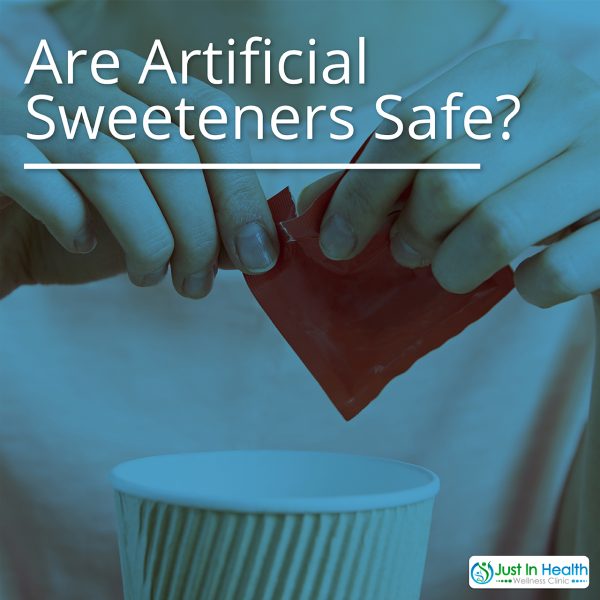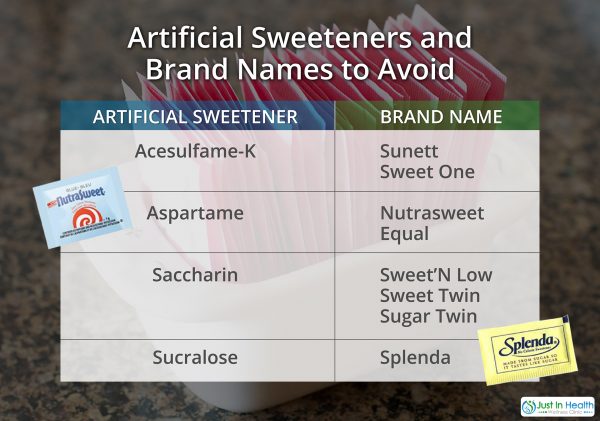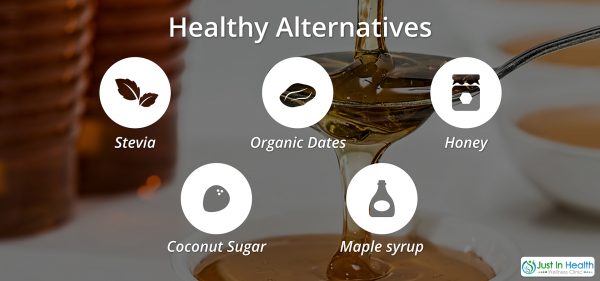

By Dr. Justin Marchegiani
Artificial sweeteners such as aspartame and sucralose are low- or zero-calorie alternatives to natural sweeteners. Without much other information, this sounds like a great option for those trying to lose weight or improve their health, but there are actually many hidden dangers and side effects that stem from the consumption of artificial sweeteners.

Time and time again studies have shown that artificial sweeteners negatively impact your health. Researchers were astonished to discover that regular drinkers of diet soda were three times more likely to develop stroke and dementia. Consuming artificial sweeteners has also been linked to higher rates of depression, kidney damage, type 2 diabetes, arthritis, multiple sclerosis, headaches and migraines, hyperthyroidism, lupus, brain tumors, low blood sugar, and cardiovascular disease!
When you consume diet or sugar-free products, the zero-calorie artificial sweeteners play tricks on your taste buds and on your brain. Your brain senses sweetness, and our bodies expect the calories that usually follow with the sweet signal. Studies show your body can still produce an insulin spike, hence the relationship between sugar-free sweeteners and diabetes.
In addition to an unwarranted insulin spike, the lack of calories in artificial sweeteners leaves you very unsatisfied, and research shows people fill the calorie gap with other foods in order to become satiated. And since artificial sweeteners range from 200-20,000 times sweeter than sugar, they are addictive. Consumers of these sweeteners literally become addicted and crave more and sweeter foods.
Another large contributor to the dangers of artificial sweeteners is the effect that they have on the microbiome. Artificial sweeteners disturb the bacteria in your gut, which can cause glucose intolerance even in healthy people, and tampers with the gut-brain connection.
Artificial sweeteners are often hiding in plain sight. Most products labeled “diet,” “sugar-free,” and “low-sugar” will contain artificial sweeteners. Use the following chart to identify common artificial sweeteners and their brand names:

Other sources of artificial sweeteners include:

If you are reducing your sugar intake but still want to sweeten your meal or drink, opt for one of these healthier options instead:
Stevia: Stevia is a plant, and is temperature-stable, meaning you can safely add it to both hot and cold foods and drinks. It is zero-calorie and zero-carb, and has zero of the side effects associated with artificial sweeteners.
*Tip: liquid versions of stevia are easiest to dose.
Organic dates: Dates are another great option. While high in sugar, using dates in moderation provides you with vitamin B, manganese, magnesium, copper, iron, and potassium!
Honey: Raw and local is best! Local honey can help with allergies. Raw honey contains enzymes, antioxidants, iron, zinc, and many other vitamins and minerals that promote healthy gut bacteria. To retain the health benefits of raw honey, keep it away from heat. If you want to use it to flavor a warm beverage, rather than adding it in right after boil, wait until your tea or coffee cools down.
Coconut sugar: Coconut sugar has a low glycemic load, which makes it a great choice as an alternative to sugar. It is also rich in minerals, polyphenols, and antioxidants!
Maple syrup: A sweetener rich in antioxidants and minerals, maple syrup is a simple and natural choice, straight from the tree!
Try swapping diet soda for kombucha, a delicious fermented tea packed with probiotics! They even make kombucha that is flavored to taste like popular types of soda, only the kombucha versions are actually beneficial for your health. If you’re going to have dessert, avoid ‘sugar-free’, ‘diet’, and ‘low-sugar’ packaged foods. While cooking at home, rather than feeling constrained because you are avoiding artificial sweeteners, have fun and experiment with the abundance of natural options available!